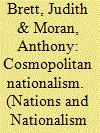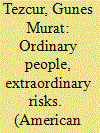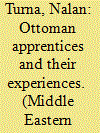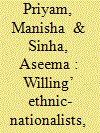|
|
|
Sort Order |
|
|
|
Items / Page
|
|
|
|
|
|
|
| Srl | Item |
| 1 |
ID:
102837


|
|
|
|
|
| Publication |
2011.
|
| Summary/Abstract |
This article challenges the theoretical opposition between nationalism and cosmopolitanism with empirical research on the ways in which a group of ordinary Australians talked about multiculturalism in the 1980s and again in the 2000s. It shifts attention from identity work to the understanding of day-to-day social relations: it finds that they are strongly nationalist and yet also display a cosmopolitan embrace of the benefits of cultural diversity. They draw on the inclusionary resources of Australian nationalism and its history to strengthen their cosmopolitanism and calm their anxieties about living with diversity. Their commonsense conceptualising of Australia's contemporary multicultural society in terms of a mix of individuals rather than an ensemble of groups is crucial to understanding why cultural diversity has been embraced within the framework of the nation.
|
|
|
|
|
|
|
|
|
|
|
|
|
|
|
|
| 2 |
ID:
147238


|
|
|
|
|
| Summary/Abstract |
Why do ordinary people take extraordinary risks and join an ethnic armed rebellion? This article tests a series of well-established hypotheses about selfish and identity based motivations and a new hypothesis based on prospect theory. It then employs a unique multimethod research strategy combining one of the most comprehensive datasets on insurgent recruitment that contains biographical information about 8,266 Kurdish militants with extensive fieldwork involving in-depth interviews with relatives of the militants to test these hypotheses. The findings show the decision to rebel is as much political as economic and social. While security concerns and expectations of benefits affect the decision to rebel, social commitments, identities radicalized by state repression, and collective threat perceptions among efficacious individuals generated by political mobilization, rather than preexisting ethnic cleavages, also lead to participation in an ethnic insurgency. The latter findings explain the durability of insurgencies with limited economic resources and their ability to attract educated fighters.
|
|
|
|
|
|
|
|
|
|
|
|
|
|
|
|
| 3 |
ID:
166764


|
|
|
|
|
| Summary/Abstract |
In this article, I analyze craft and trade apprentices in the late Ottoman Empire in order to add a new dimension to the existing literature on guilds and artisans. Rather than presenting an ideal picture, I discuss the apprentices' actions and experiences, which I argue did not take place in isolation.
First, I briefly discuss Ottoman guilds and artisans, including a literature review, define and explain both the system of apprenticeship and who apprentices were.
|
|
|
|
|
|
|
|
|
|
|
|
|
|
|
|
| 4 |
ID:
193624


|
|
|
|
|
| Summary/Abstract |
Using evidence regarding the consolidation of Hindu nationalism in India we put forward new ethnographic data about the variety of popular support for a Hindutva project and a new framework that proposes an interactive theory of social identity. This framework helps us understand how Hindu nationalism becomes embedded in society. We assert that Hindu nationalism in India could be fruitfully analysed by focusing on the processes through which ideas of exclusive nationalism spread among ordinary middle-class people and are expressed in micro-level psychological changes at the individual level. The consolidation of Hindu nationalism in India is being authored not only by parties or the state, but also by societal actors, specifically, ordinary middle-class Indians. Hindu nationalism has been spreading in micro-public spheres in a time of apparent peace and between elections, and with the participation of willing supporters. Building on our fieldwork and research in psychology and history, our conversations have also helped us to identify profiles of different types of nationalists, which we categorize as willing ethnic-nationalists, hardliners, bystanders, and moderates. Further, we suggest the need to focus on inter-linked micro-level mechanisms such as diffusion and emulation of Hindu-centric beliefs and ideas, mobilization by hardliners and organizations, and impunity resulting from protection by state agencies, which helps to create willing ethnic-nationalists and sustains Hindu nationalism. Evidence regarding social interactions from a variety of survey organizations concurs with our findings and our ethnographic material allows us to delve deeper into varieties of Hindu nationalist support across diverse ordinary people.
|
|
|
|
|
|
|
|
|
|
|
|
|
|
|
|
|
|
|
|
|